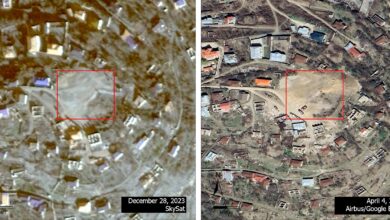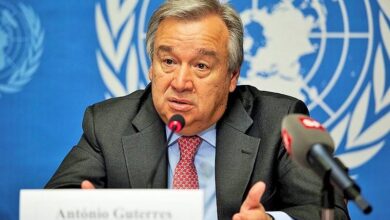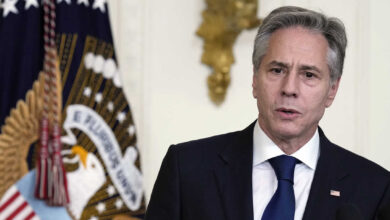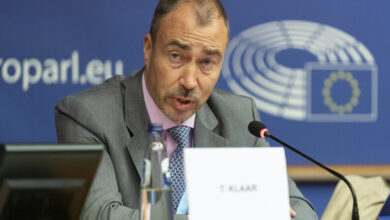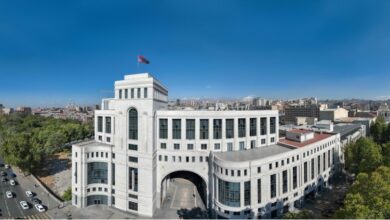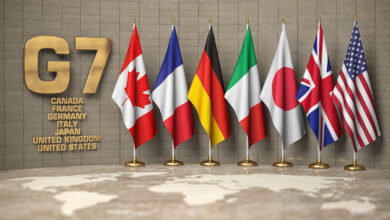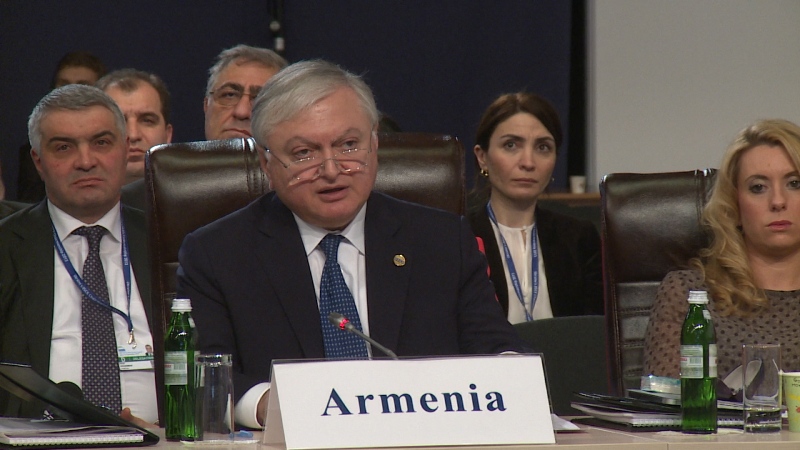
Statement by Mr. Edward Nalbandian Minister of Foreign Affairs of the Republic of Armenia 20th Meeting of the OSCE Ministerial Council
Mr. Chairman,
Dear Colleagues,
Ladies and Gentlemen,
I would like to start my address by expressing our condolences on the passing away of Nelson Mandela. I warmly remember my meeting and conversation in Pretoria with this great and wise statesman and leader.
I want to join the previous speakers in conveying my gratitude to the Chairman-in-Office, Minister L. Kozhara and his team for their efforts and contribution to the activities of the Organization throughout the year, as well as to thank the Government of Ukraine for the warm hospitality and successful organization of this Ministerial meeting.
The OSCE Ministerial meetings are always an opportunity to exchange views on how to raise the effectiveness of the Organization as a platform for generation of ideas and elaboration of concepts that would eventually contribute to Euro-Atlantic and Eurasian security. The world we live and the security environment we are in, are transforming at an increasing pace; we have to address the common challenges and find the right solutions to them.
The year behind us was in many ways important in regard to positive deliberations and outline of positions. I would like to particularly mention the “Helsinki + 40” process. We perceive it as a process aimed at full realization of the vision of free, democratic, common and indivisible security community envisaged in the Astana Commemorative Declaration.
Views presented and the conclusions reached in the Progress Report by the Chairmanship on “Helsinki + 40” could be a ground for the future consecutive Chairmanships to take the process forward.
Our adherence to the vision of security community free of dividing lines and closed borders is an essential departure point to overcome divisions and strengthen trust and confidence among all participating states aimed at reconciliation. This should exclude unilateral blockades which have persisted in the OSCE area. This year the closure of borders with Armenia by Turkey turned into its third decade.
Mr. Chairman,
The effectiveness of our Organization to a great extent depends on our collective will and ability in an equal and balanced way to maintain our activities in all three dimensions.
The Security Dimension remains high on our agenda. We need to exert additional efforts for further modernization of the Vienna Document and full implementation of all confidence and security building measures. As for the current state of affairs in regard to conventional arms control regime, we should narrow our different perceptions and try to come to an agreement.
The intricate link between economic activity and environment is evident in our daily life. Armenia supports the Environment and Security Initiative (ENVSEC) and is taking steps to create an electronic mining database in the framework of Open Government Partnership, which could serve the purpose of improvement of the environmental transparency in our region.
The decisions on the agenda to be adopted at this meeting on the Human Dimension could become an additional tool for the protection of fundamental human rights in the OSCE area.
Trafficking in human beings is still one of the disgraceful violations of human rights that needs to be effectively repudiated. Armenia’s efforts to fight this crime have been duly recognized by our partners.
Mr. Chairman,
The Government of Armenia is implementing a wide package of reforms to further consolidate the democratic institutions, strengthen the rule of law, protect and promote human rights and fundamental freedoms, improve electoral procedures and relevant legislation, strengthen independent judicial system and expand the role of civil society.
The OSCE plays an important role in advancing democratic reforms in Armenia.
Our close work with the ODIHR and the Representative on the Freedom of Media and implementation of relevant recommendations is very productive.
The 2013 Presidential elections in Armenia were assessed by OSCE/ODIHR Elections Observation Mission to be in compliance with OSCE commitments and other international standards for democratic elections.
I would also like to mention our fruitful cooperation with the OSCE Yerevan Office which implements projects across all three dimensions.
As the Chair of the Committee of Ministers of the Council of Europe, Armenia during the last six months stressed the necessity to further consolidate cooperation between the OSCE and the Council of Europe. Building on synergies of our efforts and avoiding duplications, our two organizations can achieve better results in protecting and promoting human rights and fundamental freedoms.
Mr. Chairman,
The resolution of the existing conflicts in the OSCE area continues to remain a serious challenge.
In this June in Enniskillen in the framework of the G8 Summit the Presidents of the three Co-Chair countries of the OSCE Minsk Group – Russia, United States and France, issued a new, fifth consecutive statement on the peaceful settlement of the Nagorno-Karabakh conflict, where they once again stressed that only a negotiated settlement can lead to peace, stability, and reconciliation.
In Armenia we welcomed this statement saying that, as the Co-Chairs, we continue to believe that the principles and elements outlined in the statements of the heads of the Co-Chair countries over the last five years can be the basis for reaching a fair and lasting settlement of the conflict. We share the position of the Co-Chair countries, that those principles and elements should be seen as an integrated whole and that any attempt to select some elements over others would make it impossible to reach a compromise and achieve a solution. We absolutely agree that peoples should be prepared for peace, not war. Armenia has on several occasions reiterated and in response to the Enniskillen appeal of the Presidents of USA, Russian Federation and France, once again re-affirmed its commitment to the principles of international law – the non-use of force or the threat of force, equal rights and self-determination of peoples, and territorial integrity.
On November 19, for the first time since January 2012, a meeting between the Presidents of Armenia and Azerbaijan took place in Vienna, and everyone knows that it was not because of Armenia that for about two years Summit meetings were not organized. In Vienna the Presidents agreed to advance negotiations towards the peaceful settlement of the conflict and instructed Foreign Ministers to continue in cooperation with the Co-Chairs to build on the work to-date with the aim of intensifying the peace process. With this aim the first meeting between Ministers was held on December 4th and we agreed to continue such meetings. We do hope that Azerbaijan is really returning to the table of negotiations with a constructive approach, which could enable us to speed up efforts to reach agreement on the basic principles, about which the Co-Chairs on the highest level have made several appeals and about which the Presidents of Armenia and Azerbaijan expressed their willingness in the last joint statement adopted in January 2012 in Sochi.
A constructive approach is necessary for reaching not only an agreement on the principles of the settlement, but also for the realization of the confidence-building measures, proposed by the Co-Chairs and supported by Armenia, such as consolidation of ceasefire, withdrawal of snipers from the line of contact and the establishment of a mechanism for the investigation of ceasefire violations.
To achieve a durable peace, stability and security in the region, Armenia will continue to invest its utmost efforts towards the settlement of the Nagorno-Karabakh conflict exclusively through peaceful means and on the basis of the purposes, principles and norms reflected in the UN Charter and the provisions of the statements of the Minsk Group Co-Chair Countries’ Presidents in L’Aquila, Muskoka, Deauville, Los Cabos and Enniskillen.
Mr. Chairman,
To conclude, I would like to express Armenia’s readiness to support the incoming Swiss Chairmanship in the implementation of its agenda.
Thank you. “



